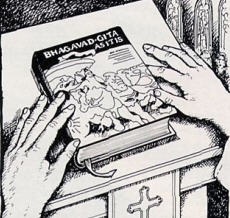At his mother's funeral a devotee of Krsna draws on the wisdom of the
Bhagavad-gita to enlighten mourners and relieve their grief.
My mother had been a kidney dialysis patient for nine years. Since the average life expectancy for dialysis patients is five years, her recent death was not unexpected. But when someone dear to you dies, you are never really ready for it. Even if you try to prepare yourself, you can't avoid the sense of loss.

For years I had wondered how I would react to my mother's death. What would I say? What would I do? I had decided years ago that no matter how I felt, I would give at least part of the eulogy at her funeral. I knew she had wanted a son who was a minister. And although I never became a minister in the conventional Western sense, my life centers on my spiritual commitments. So I thought giving part of the eulogy would be the most appropriate way of paying my last respects to her.
I always had a good relationship with my parents, and I would regularly write and phone them and visit them over the holidays. When I became a full-time devotee of Lord Krsna, they would come to visit me at the temple community where I lived. My father developed a great appreciation for prasadam, vegetarian food offered to Krsna. My mother liked my pure and simple life, as well as the Bengali sweets I would send her every so often.
When my wife, Cintamani, and I would go home for a visit, my parents would always be eager and happy to eat her delicious cooking. Cintamani would offer everything to Krsna and then serve everyone. My parents were convinced that my mother's health improved whenever she ate Cintamani's cooking.
Gradually, my mother's health became so bad, however, that my parents were not able to continue visiting us, so we always tried to visit them at least a few times a year, especially at Christmas. During the Christmas season of 1986 I had a feeling that it would be our last holiday together as a family. I tried to make sure that the last impression we had of each other as a family was a good one, with no last-minute arguments unresolved or feelings unexpressed.
A few weeks later, I got a call from my dad telling me that my mother had died. I felt sad but, at the same time, relieved. I was relieved that she no longer had to struggle with her sickly body, which had caused her so much pain. But I felt a loss. When I went home for the funeral, there was a definite emptiness to the house. All the memories and the little things I usually took for granted now had a special meaning.
At the funeral the Lutheran minister conducting the service said thoughtful and comforting things. But he also said that we do not know why God causes some of His faithful to suffer, or why some of us have to endure so much heartache and pain.
When I got up to speak, I began answering the minister's questions, basing my talk on the Bhagavad-gita, Srimad-Bhagavatam, and the Upanisads, as well as the Bible. I explained the universal spiritual knowledge that the soul is eternal and transcendental to the limited, physical body. Though the body appears to die, the soul continues on to another body according to its destiny. Only the body undergoes the troubles of birth, old age, disease, and death. This suffering is one way God reminds us that this world is not our real home. Our real home is in the eternal, spiritual kingdom of God. God is our actual well-wisher and guardian. By focusing our love on Him, we can solve the most difficult problems. Regaining our love for Him is the price for returning to our eternal, spiritual home, the goal of human life.
After I had spoken, many persons told me how much they appreciated what I had said. Even persons I didn't know came forward and shook my hand, saying how much they were impressed by the eulogy. Days later people still spoke to my father about my talk and asked if I was a minister. I could understand that true spiritual knowledge, as presented in the Vedas, can relieve people of their confusion about life and their anxiety caused by not knowing what lies beyond death.
Several times over the next few days, my father told me that after I had spoken he suddenly felt better. He hadn't found anything faulty in what the minister had said, but after my talk he could understand that he had known my mother on the physical level, and that now she had gone on to another realm to continue her destiny. He understood that although he would miss her, there was no reason to grieve.
I was happy that I could help my father by giving him enlightenment through spiritual knowledge during this difficult time. And I felt increased conviction for the teachings of Krsna consciousness, so mercifully given to us by His Divine Grace A.C. Bhaktivedanta Swami Prabhupada.
